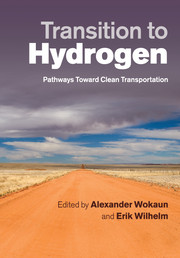Book contents
- Frontmatter
- Contents
- Contributors
- Foreword: on the transition to hydrogen
- Preface
- Executive summary
- Abbreviations
- 1 Introduction
- 2 Life cycle assessment of hydrogen production
- 3 Technical characterisation and multi-criteria analysis of light-duty vehicles
- 4 Hydrogen emissions to the atmosphere from industry and transportation
- 5 Regional fleet simulation
- 6 Long-term scenarios of the global energy and transport system
- 7 Integrated assessment of hydrogen in transportation
- Appendix A Summary of fundamental assumptions
- Appendix B Selected input assumptions, technology descriptions, and heuristics
- Appendix C Characteristics of the present and future vehicle designs
- Appendix D Survey questionnaire and aggregated responses
- Appendix E Assumptions and inputs driving fleet dynamics simulation
- References
- Index
- Plates
6 - Long-term scenarios of the global energy and transport system
Published online by Cambridge University Press: 05 November 2011
- Frontmatter
- Contents
- Contributors
- Foreword: on the transition to hydrogen
- Preface
- Executive summary
- Abbreviations
- 1 Introduction
- 2 Life cycle assessment of hydrogen production
- 3 Technical characterisation and multi-criteria analysis of light-duty vehicles
- 4 Hydrogen emissions to the atmosphere from industry and transportation
- 5 Regional fleet simulation
- 6 Long-term scenarios of the global energy and transport system
- 7 Integrated assessment of hydrogen in transportation
- Appendix A Summary of fundamental assumptions
- Appendix B Selected input assumptions, technology descriptions, and heuristics
- Appendix C Characteristics of the present and future vehicle designs
- Appendix D Survey questionnaire and aggregated responses
- Appendix E Assumptions and inputs driving fleet dynamics simulation
- References
- Index
- Plates
Summary
Introduction
The earlier chapters considered a number of important factors for the transition to alternative fuels and vehicles, including issues of market introduction, environmental and resource impacts, possible vehicle configurations, and comparative pollutant emissions. These are highly relevant and practical considerations for assessing the options and processes to facilitate a shift to alternative fuels. In this chapter, we expand on these earlier chapters to consider a possible transition to alternative fuels and transportation technologies in a broader, global, and longer term context. Specifically, we consider energy system interactions and technological change, major driving forces of global economic and demographic change, resource availability, and climate change policy. This complements and extends the approach in Chapter 5 which analysed factors driving deployment of new vehicle technologies from consumer and regulatory perspectives.
Let us briefly introduce each of the important global and long-term issues mentioned above, considering first energy system interactions. To assess the suitability of different technological options for the transport sector over the longer term, it is also necessary to consider technological options in the energy sector (for supplying fuels to transportation), and trends in other end-use sectors (which compete for the same energy carriers used by transportation). In the energy sector, the pace of technological change, bottlenecks to the deployment of new technologies (such as a hydrogen refuelling network), and technological lock-ins (for example, the current integrated system of oil production, distribution, and refining) are further factors likely to influence the suitability of potential alternative fuels and technologies in transportation.
- Type
- Chapter
- Information
- Transition to HydrogenPathways Toward Clean Transportation, pp. 177 - 211Publisher: Cambridge University PressPrint publication year: 2011



